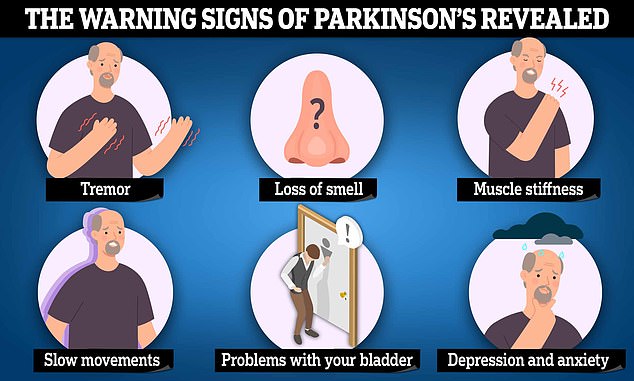[ad_1]
Experts are warning millions to lose weight after research revealed a cluster of common health problems can dramatically raise the risk of Parkinson’s disease.
The condition, known as metabolic syndrome, isn’t a disease in itself but the medical name for having several linked issues at once.
These include obesity, high blood pressure, high blood sugar, raised blood fats known as triglycerides, and low levels of ‘good’ HDL cholesterol – found in foods such as olive oil, nuts and blueberries.
A study of 467,000 people has now shown that those with metabolic syndrome face a 40 per cent higher risk of developing Parkinson’s – the progressive brain disorder that causes tremors, stiffness and difficulty moving.
The results, published in Neurology, held true even after accounting for factors such as age, smoking, exercise and genetics.
Researchers followed participants, whose average age was 57, for 15 years. During that time 3,222 developed Parkinson’s. When the data was combined with eight earlier studies covering nearly 25 million people, the increased risk still held at 29 per cent.
Lead author Dr Weili Xu, of the Karolinska Institutet in Stockholm, said: ‘Our findings suggest that metabolic syndrome may be a modifiable risk factor for Parkinson’s disease.
‘We also found a higher risk for people with both metabolic syndrome and a genetic susceptibility.
‘This suggests that maintaining metabolic health may be especially important for those who already have genes that raise their risk.’
Dr Xu added that more research is needed to prove whether tackling metabolic syndrome directly reduces the risk of Parkinson’s.
Metabolic syndrome is thought to affect around one in four adults – many without realising it.
The NHS warns you are more likely to develop it if you are overweight, inactive, smoke or drink heavily. Age, and having a Hispanic or South Asian background, also raise the risk.
In the UK around 166,000 people are living with Parkinson’s, a figure expected to double by 2050.
Early symptoms can include fatigue, constipation, sleep problems and a reduced sense of smell, often years before classic signs like tremors and balance issues appear.
While not directly fatal, the disease leaves sufferers more vulnerable to life-threatening infections.
Famous figures who have battled the disease include actor Michael J. Fox, who was diagnosed in 1991 at just 29, and went public seven years later.

The little-known group of conditions can lead to Parkinson’s disease, the fresh study revealed
Since then the Back to the Future star has become the leading campaigner for research, founding The Michael J. Fox Foundation, which has raised billions to find a cure.
Rock legend Ozzy Osbourne revealed in 2020 that he had been diagnosed the year before, describing the toll it has taken on both his body and mind.
The Black Sabbath frontman, who died in July, spoke candidly about the “never-ending” struggle with the disease and how it has forced him to scale back performing.
And earlier this summer, A-ha singer Morten Harket disclosed that he too is living with Parkinson’s.
The 65-year-old Norwegian underwent neurosurgery in 2024 to implant deep-brain stimulation electrodes which have eased his symptoms, but he admitted he may never sing in the same way again.
The findings come after Chinese scientists earlier this year linked diets high in ultra-processed food to a greater risk of Parkinson’s.
They found people eating 11 or more servings a day – the equivalent of cans of fizzy drink, ketchup or ready-made meals – were two and a half times more likely to show early signs of the illness compared with those eating three or fewer.
Even three daily servings raised risk by up to 60 per cent.
[ad_2]
This article was originally published by a www.dailymail.co.uk . Read the Original article here. .

